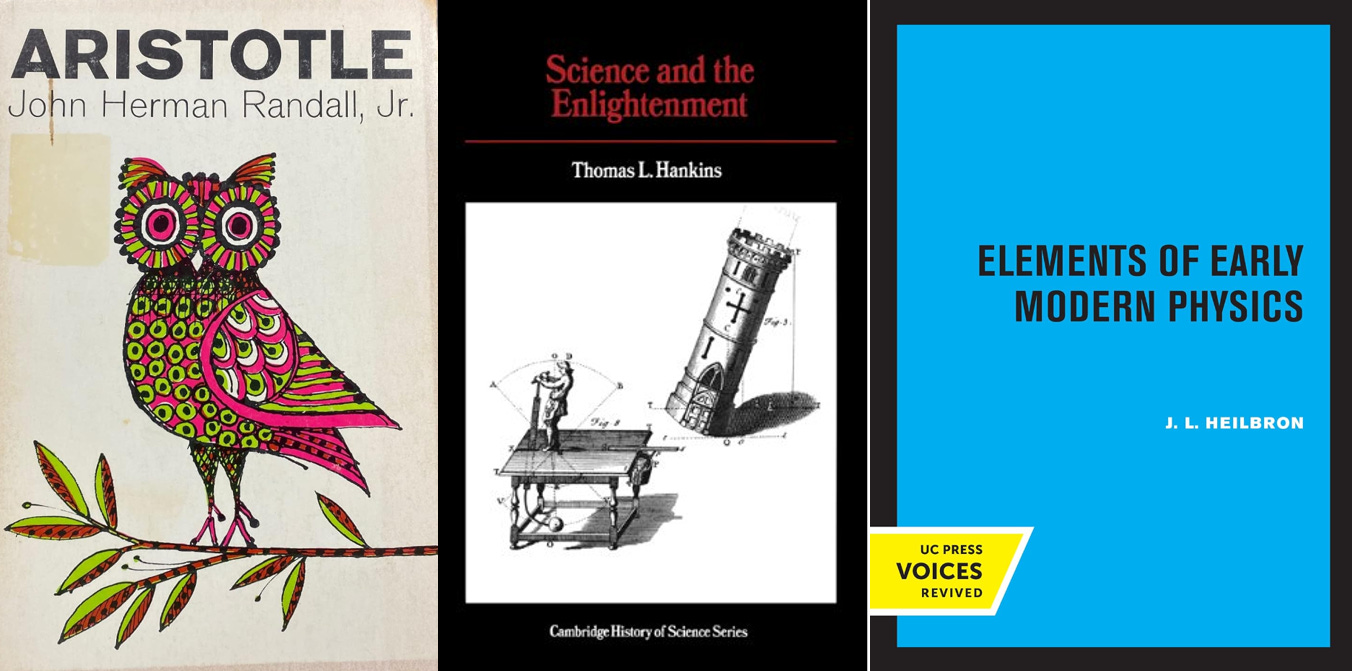Reading List for Chapter 2: Aristotle, Plato, and Newton
And Where to Get Started Reading About the Origins and History of Science
I want to highlight a couple of the references from this chapter as being of particular value. First, John Herman Randall’s Aristotle summarizes the ideas of one of the first and greatest thinkers in human history. See: https://amzn.to/2O1UwWh.
A book I recently acquired but have not had the chance to dig into is A.C. Crombie’s Robert Grosseteste and the Origins of Experimental Science 1100-1700. See: (https://amzn.to/49Fn5z7).
Several historians have tackled early modern physics in a comprehensive manner. Two who influenced me are Thomas L. Hankins Science and the Enlightenment (https://amzn.to/3UdSzb4) and J.L. Heilbron, Elements of Early Modern Physics (https://amzn.to/3SpLX7l).
I also appreciate A. Rupert Hall who wrote both From Galileo to Newton (https://amzn.to/4b0w13H) and The Scientific Revolution 1500-1800 (https://amzn.to/3tXYDdk). Alessandro De Angelis’s new edition (https://amzn.to/3UvugFS) of Galileo’s Two New Sciences looks very promising. See John Plaice’s take on it over at Fiat Lux.
The classic work of Newton biography is Richard Westfall’s comprehensive tome, Never at Reft: A Biography of Isaac Newton (https://amzn.to/497woZ1). Less ambitious scholars might prefer his shorter The Life of Isaac Newton (https://amzn.to/3HQcxkT). The best way to understand the thoughts of the great scientists is to read their original writings. I wouldn’t wish to inflict the full text of Newton’s Principia on “little Smatterers in Mathematics” or anyone else, but some sections are quite readable. I found a wonderful little book Newton’s Philosophy of Nature: Selections from His Writings which has since been reprinted by Dover Publications (https://amzn.to/4bxRd1a). It pulls out and condenses some of Newton’s most readable and insightful thoughts.
Carl Boyer’s A History of Mathematics is an excellent overview of the subject (https://amzn.to/3S8levE). I go there when I want to know more about a particular mathematician or the history of a particular mathematical concept.
The brilliant Clifford Truesdell, whose writings are as excellent as they are difficult to find at a reasonable price, authored Essays in the History of Mechanics, explaining the development of Newtonian physics. See: https://amzn.to/2O6Autv. Most anything he wrote is worth reading: opinionated, iconoclastic, devastatingly independent-minded, and brilliantly reasoned. You’ll probably have to search used book sources to find his works at a reasonable price.
A minor aside on Clifford Truesdell… I wrote an essay on science for a magazine, and a friend offered a quote by Truesdell that captured the essence of what I was awkwardly trying to say: “Things that appear simple had to be made that way by someone.” That was the hook I needed to check him out. Essays in the History of Mechanics was fundamental in making me rethink my blind trust in science. If you want to know how the sausage was made, track down a copy and read it. Truesdell also wrote such gems as “The Computer: Ruin of Science and Threat to Mankind.” You’ll find the first page here (https://link.springer.com/chapter/10.1007/978-1-4613-8185-3_41). The rest is paywalled. Truesdell is well worth setting up a search to notify yourself when a less expensive used copy becomes available.
A few years ago, I noticed his personal library was being disposed of and I purchased a copy of O.D. Kellogg’s Foundations of Potential Theory that Truesdell owned. What a find! Truesdell signed the inside cover indicating that he acquired it in 1958 in Bloomington (IN) as a gift, replacing a copy of a reprint. Throughout, Truesdell inserted little slips of paper on which he verified the book’s mathematics or made extensions upon the book’s discussion. What other gems like this are lost now that the library of this brilliant man has been cast to the wind?
Michael Flynn’s multi-part Analog 2013 article on the “Ptolemaic Smackdown” is well worth a read: https://tofspot.blogspot.com/2013/08/the-great-ptolemaic-smackdown.html.
I’m a newcomer to scholarship on occult influences on history in general and science in particular. Robert Frederick’s The Hidden Life is Best podcast was my gateway drug, focusing as he does on the pivotal role of Francis Bacon in today’s cult of scientism.
Like Newton, Bacon usually sought to be hard to understand so his meaning would become clear only to the most insightful reader. Bacon’s New Atlantis (https://amzn.to/3HZQGYd) is a short and easy read, though.
I’m also finding Matt Ehret’s and Cynthia Chung’s work on the occult roots of history worth reviewing. See their new series, The Hidden Hand Behind UFOs at https://canadianpatriot.org/ and follow their Substacks here:
and here:
John Plaice’s Fiat Lux Substack is great to follow for interesting in-depth takes on the history of science.
Seiler on Science is similarly insightful. Seiler argues that science and religion are incompatible in his book God Versus Nature (https://amzn.to/496DPj8).
Sarah Salviander offers a contrary take at her Schrödinger's Poodle Substack.
What are your favorite books and sources on the early history of science? Let us know in the comments. Next time, we’ll launch into Chapter 3: The Birth of Electromagnetism.
Follow Online:
You may follow me online in other places as well:
Telegram: 𝔸𝕖𝕥𝕙𝕖𝕣𝕔𝕫𝕒𝕣'𝕤 𝔸𝕖𝕥𝕙𝕖𝕣𝕤𝕥𝕣𝕖𝕒𝕞
Gab: @aetherczar
Twitter: @aetherczar
Amazon: Hans G. Schantz













This is a good work showing the intellectual progression from Newton: https://a.co/d/0jp3bXU